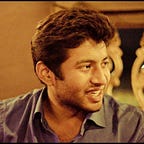The tryst with ‘faith’
It was the monsoon of 2007 when I first flirted with the idea of atheism. Just like any other irritating, yet passionate early teenager, I had developed a rebellious attitude towards everything. I disliked being told what to do, and that inevitably included following religious and cultural practices.
I was in Nagpur at the time, studying in a school that greatly valued Hinduism and Marathi culture. So to question something as core as the existence of God was an uncharted territory. I admit it, I never spoke about my doubts about theism out loud. But then someone else did, and I hopped on to the boat.
The grounds of my atheism were clear. If you want to achieve something, work for it. Praying to God or having ‘faith’ is utterly useless. And thus began my annoying superiority complex. I would look at people, often as old as 40–50 (the previous generation), and wonder how in all these years they never thought about looking for rationale in their theistic actions. Nothing would convince me otherwise. Interestingly, all this mocking of religious people was mostly in my head. I wasn’t this big a jerk in front of people, and I pretended to respect their choices to their faces. I would partake in religious and cultural activities, simply because it was rude not to.
Fast forward to today, and I get the importance of ‘faith’. So what happened in these years? How can a strong belief take a 180 degree turn?
Don’t get me wrong — I am not here to argue whether Mahabharata really happened, or that Jesus turned water into wine. The extent of reality of these tales is a different discussion, something that requires much more research and nuance, and something that is perhaps, endless. However, I have come to realise that faith is much more complex than simply the existence of superhuman beings or supernatural actions.
The strongest opposition to conventional mythology is science and rationality. Any scientifically aware person tends to challenge everything related to religion, and it’s most definitely a wonderful thing. Science and rationality are modern humankind’s best gifts. Nothing gets accepted until it has the approval of equally proficient peers. Everything can be explained through equations and every situation can be reproduced. It’s almost unimaginable to think of a better system. It’s near perfect.
And yet, in my personal opinion, rationality is not enough to lead a fulfilling life.
Celebrated author Mark Manson argues that emotions are overrated. There’s a lot to take away from that argument, and I get what he is trying to say. But I feel emotions are quite important, and the idea is to strike a healthy balance between emotions and logic.
Emotions are the single most powerful tool known to humanity. No amount of intelligence or technological advancement can ever beat the power of emotions. Unfortunately, this excessive power makes emotions a double-edged sword. The world found it the hard way, when a certain dictator harnessed his public speaking skills to orchestrate a mass genocide. I didn’t want to remind anyone of that, but there is hardly a better example. On the brighter side, emotions can do wonders. Did you know Didier Drogba once stopped a civil war? Simply because the people who were fighting amongst each other respected and admired him more than they hated each other.
When people pray, they are essentially deriving strength that rationality cannot provide. I experienced this when my loved ones were in the hospital, fighting against COVID-19. If you look continuously at the hard probability of survival rates when you are in the hospital, you are only going to make your situation worse. It’s the strong hope for miracle, that often actually causes miracles. That is not to say that people do not need doctors or in more generic terms, logical or rational efforts. But channeling the right emotions at the right time certainly acts as a big catalyst. And this, my friends, is what I call ‘faith’.
So when people pray, they are hoping to surmount a seemingly insurmountable mountain. Religion, when used judiciously, can solve problems that logic can never solve. How to harness that power, however, still remains a mystery.
